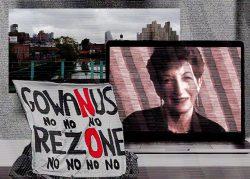A state court judge on Tuesday threw out a challenge to the Gowanus rezoning, giving local opponents two main reasons for the decision: You are late, and even if you weren’t, you have no case.
Voice of Gowanus, Friends and Residents of Greater Gowanus and individuals in the Brooklyn neighborhood sued in February, alleging the city had not adequately considered the environmental consequences of the rezoning. It was their second lawsuit against the plan, which is expected to create homes for about 25,000 people.
Judge Consuelo Mallafre Melendez, however, granted the city’s motion to dismiss the case, finding that the groups “either fail to point to any specific shortcomings in the [final environmental impact statement] or support these shortcomings with any substantive evidence other than their own opinions.”
She said the city “reasonably concluded that the rezoning would not result in any major adverse environmental impact based on its comprehensive and thorough review.”
Read more



The opponents did not help their case by notifying the city of their lawsuit late, which the judge deemed “substantial and unexcused.”
A party has four months and 15 days to file a complaint challenging the decision of a state or local agency. The groups’ suit in February was well within that time frame, given that the rezoning was approved in November, but they did not provide notice of the petition until late April — 19 days after the deadline.
The city argued in its motion to dismiss that the group’s attorney should have been acutely aware of the consequences of missing the deadline.
The lawyer, Richard Lippes, was involved in a challenge to the Hudson Companies’ redevelopment of a Brooklyn Heights public library, which was to include a 36-story condo building. The case was dismissed in 2016 in part because the lawsuit was not served within the statute of limitations. The decision was upheld by an appellate court in 2019.
Lippes was not immediately available to comment. Voice of Gowanus indicated that it is reviewing its legal options, and noted that it has not yet had an opportunity to present evidence on the need to halt construction that relies on the rezoning.
The rezoning affected 82 blocks that had been largely restricted to industrial use. Officials estimated that the change would result in the construction of more than 8,500 apartments, 3,000 of which would be set aside for low- and moderate-income New Yorkers.
The June 15 expiration of the property tax break 421a could complicate these plans, but a number of projects pre-qualified for the exemption and need construction loans to maintain that status. Some lenders had been waiting for a favorable ruling on the lawsuit, a source said.
The decision also bodes well for nearby public housing developments, which were promised $200 million by the city in its rezoning deal with the City Council. The de Blasio administration also pledged $174 million in sewer upgrades to reduce the risk of sewage flowing into the Gowanus Canal.
